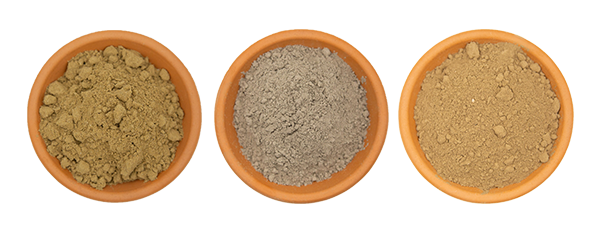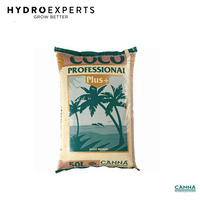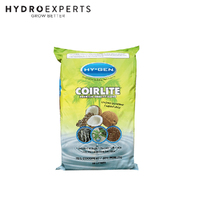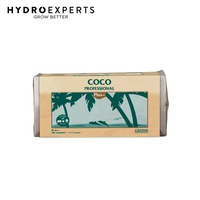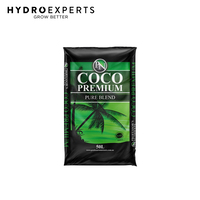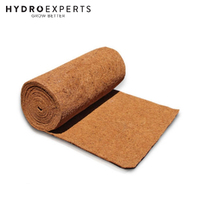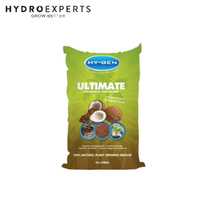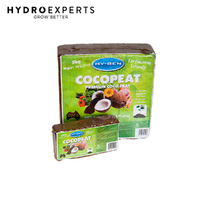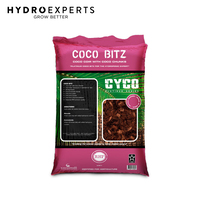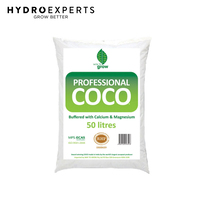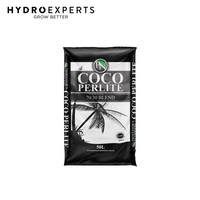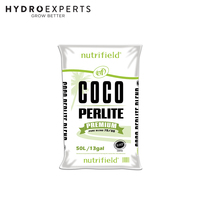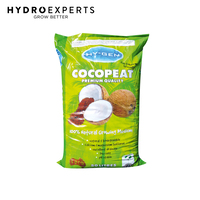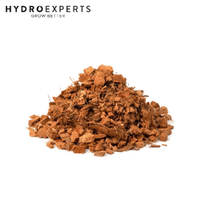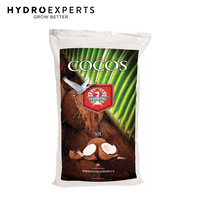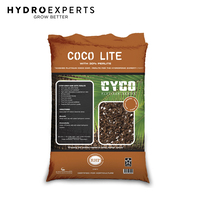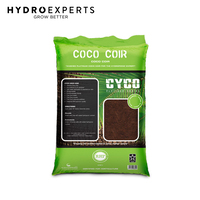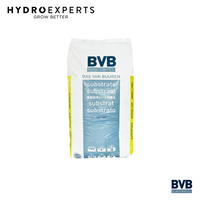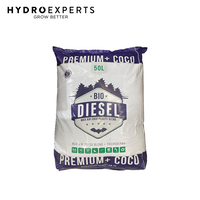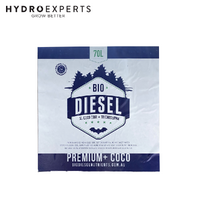COCO COIR - The ideal natural grow medium for hydroponics and rare plants.
At Hydro Experts, we carry a wide selection of premium coco coir products for all your growing needs. Coco coir is an ideal natural grow medium made from coconut husks that offer many benefits for your plants.
Coco coir is an organic alternative to peat moss, offering better aeration and water-holding capacity. It's sterile, resists compaction and provides an optimal environment for roots to thrive. Coco chips, made from coarsely shredded coconut fibre, are ideal for potting mixes and light, well-draining soils. Coco peat, finely ground coconut husk fibres, creates nutrient-rich growing mediums for seed starting and hydroponics.
Coconut fibre grow mediums provide plants with ideal porosity for proper drainage and oxygen exchange while still retaining moisture. The neutral pH makes coco coir suitable for most types of plants. Coconut husk planting mediums are also reusable and easy to rinse and sanitize between crops.
Whether you grow hydroponic plants, rare tropical species or indoor house plants, coco coir grow mediums from Hydro Experts provide the optimal balance of nutrients and drainage to support healthy root development and maximize plant growth. Our selection of coco perlite mixes, coco chips, coco peat and coconut husk products offer natural, sustainable options for any indoor or outdoor grower.
4 Related Content Found
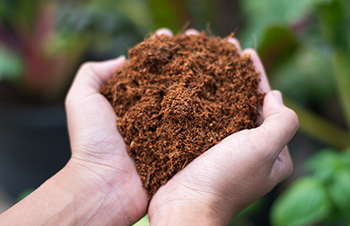
Why you need Cal-Mag in Coco Coir?
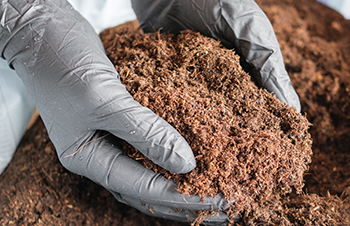
How to Use Soil Amendments-Sphagnum Peat Moss
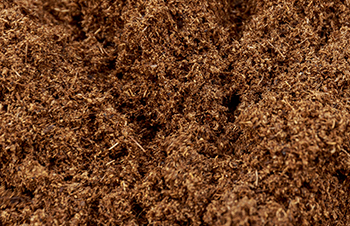
What does 'quality coco medium' really mean?
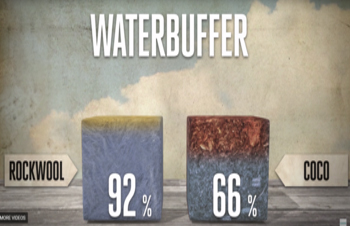
Coco and buffering
What is coco coir and why use it as a hydroponic medium?
So, what is coco coir? Coco coir is a type of coconut fibre that is derived from the husks of coconuts. It's an incredibly versatile material that can be used for a variety of purposes, including hydroponics.
Coco coir is an excellent hydroponic medium because it holds moisture well, is easy to use and maintain, and is environmentally friendly. Plus, it's a great alternative to soil! Coco coir is the way to go if you're looking for a top-quality hydroponic medium.
The Benefits of Coconut Coir
Coconut coir is an amazing grow medium for a number of reasons. For one, it leads to quick harvests and big yields. This is because the roots have plenty of room to spread out and the coconut coir provides them with all the nutrients they need.
Another great benefit of coconut coir is that it is pH-neutral. This means that it won’t throw off the delicate balance of your soil, which can lead to problems with your plants.
Finally, coconut coir is environmentally friendly. It is a reusable grow medium, so you can feel good about using it without harming the planet. Plus, it minimizes harmful pathogens and reduces the risk of pests, so you can grow your plants without worry.
There are a few things to keep in mind when using coconut coir as a growing medium.
First, it is important to make sure that the coir you purchase is of high quality. This will ensure that your plants get the best possible growing conditions. Secondly, be sure to add some perlite to the mix. This will help improve drainage and prevent the roots from getting waterlogged.
If you’re looking for an easy-to-use, eco-friendly grow medium, coconut coir is a great option. With its many benefits, it’s no wonder that more and more growers are choosing to use it.
Give it a try in your next garden and see for yourself!
Check out some of our in-depth blogs about growing mediums and coco-coir above
Q: Is Coconut Coir Superior to Soil?
A: Coconut coir exhibits certain advantages and limitations compared to traditional soil. It's important to understand these differences to determine when and how to use coconut coir effectively:
-
Fast Drying: Coconut coir tends to dry out more quickly than soil. This characteristic can be beneficial for certain applications.
-
Lack of Inherent Nutrients: Unlike soil, coconut coir lacks inherent nutrients. Therefore, it cannot entirely replace soil in all scenarios.
For seedlings, coconut coir can yield more consistent results due to its fast-draining properties. However, for mature plants, it is often best used as a soil amendment rather than a complete replacement.
Q: What Are the Different Varieties of Coco Coir?
A: Coco coir comes in various forms, all derived from the same raw material. Each type serves distinct purposes and has unique characteristics. The primary varieties include:
-
Compressed Bricks: These bricks contain compacted coco coir fibres and dust. Prior to use, they require soaking in water to expand. Once saturated, they become a highly efficient growing medium, capable of absorbing up to nine times their weight in water. eg. Canna Coco Brick & Hy-Gen Coco Block.
-
Molded Pots: Molded coco pots are shaped like traditional flowerpots. They provide an easy way to plant and grow as the pot degrades over time, leaving enriched coco coir soil in its place.
-
Coco Peat: Coco peat is the most common and user-friendly type of coco coir. It can be mixed with soil to harness the benefits of coco coir, such as improved aeration, moisture retention, and drainage while retaining the qualities of regular soil. However, it's crucial to measure and blend it correctly to avoid potential issues for your plants.
These variations in coco coir offer diverse options for gardeners, allowing them to choose the most suitable type for their specific needs.
Q: Can Insects Thrive in Coconut Coir?
A: Insects, particularly gnats, are attracted to coconut coir, especially when it is damp and humid. This is one of the reasons why coconut coir is an excellent bedding material for worms. However, if you have preexisting gnat populations, they may make nests in your coco coir pots. To mitigate this issue, it's advisable to avoid overwatering your plants.
Q: Can You Overwater Plants in Coconut Coir?
A: Yes, it is possible to overwater plants in coconut coir. Although coconut coir drains better than soil or compost, it can still retain moisture. Overly frequent watering or leaving plants in trays with excess water can lead to waterlogging. Therefore, it's important to monitor and adjust your watering practices accordingly when using coconut coir as a growing medium.
Q: Can Worms Thrive in Coconut Coir?
A: Absolutely! Worms thrive in coconut coir, making it an ideal bedding material for vermicomposting. Coconut coir fibers and coir peat enhance the drainage and overall conditions in a worm farm, improving the longevity and well-being of your worm population.

